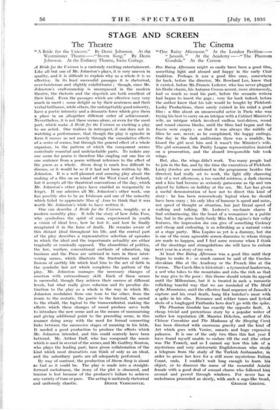STAGE AND SCREEN
"A Bride for the Unicorn." By Denis Johnston. At the Westminster Theatre—" Storm Song." By Denis Johnston. At the Embassy Theatre, Swiss Cottage A Bride for the Unicorn is a curiously exciting entertainment. Like all but one of Mr. Johnston's plays, it is very uneven in quality, and it is difficult to explain why as a whole it is so effective. In its least successful passages it is rhetorical, over-boisterous and slightly exhibitionist ; though, since Mr. Johnston's craftsmanship is unsUrpassed in the modern theatre, the rhetoric and the slapstick are both excellent of their kind. Even the passages which are effective vary very much in merit ; some delight us by their acuteness and their verbal brilliance, while others, the unforgettably good minority, have a poetic intensity and a dramatic force which give them a place in an altogether different order of achievement. Nevertheless, it is not these scenes alone, or even for the most part, which make A Bride for the Unicorn so exciting a play to see acted. One realises in retrospect, if one does not in watching a performance, that though the play is episodic in form it moves us not merely through the cumulative effects of a series of scenes, but through the general effect of a whole organism, to the pattern of which the component scenes contribute essential and undetachable parts. To isolate any one scene for praise is therefore like singling out one line or one sentence from a poem without reference to the effect of the poem as a whole. Storm Song is much less difficult to discuss, or it would be so if it had not been written by Mr. Johnston. It is a well planned and amusing play about the making of a film on an island off the West Coast of Ireland, but it accepts all the theatrical conventions of the day,. which Mr. Johnston's other plays have enabled us temporarily to forget. If one admires all Mr. Johnston's other work, one has possibly also to be an Irishman and one of the minority which failed to appreciate Man of Aran to think that it was worth Mr. Johnston's while to have written it.
One can describe A Bride for the Unicorn, roughly, as a modern morality play. It tells the story of how John Foss, who symbolises the spirit of. man, experienced in youth a vision of ideal love, how he lost it, and how he finally recaptured it in the form of death. He remains aware of this distant ideal throughout his life, and the central part of the play describes a representative selection of episodes in which the ideal and the importunate actuality are either tragically or comically opposed. The absurdities of politics, the law, warfare, conventional methods of education, big business and the Press are satirised in turn in these inter- vening scenes, which illustrate the frustrations and con- fusions of earthly life which lead him to the act of faith in the symbolic last act which completes the pattern of the play. Mr. Johnston manages the necessary changes of emotion with extraordinary skill. Each of these scenes is successful, though they achieve their success at different levels, but what really gives cohesion and its peculiar dis- tinction to the play as a whole is the way in which Mr. Johnston modulates from one tone to the other, from the ironic to the ecstatic, the poetic to the farcical, the sacred to the ribald, the logical to the transcendental, making the effects which these changes of mood produce serve both to introduce the new scene and as the means of summarising and giving additional point to the preceding scene, in this manner doing away with the need for formal connecting links between the successive stages of meaning in his fable. It needed a good production to produce the effects which Mr. Johnston intended, and this could scarcely have been bettered. Mr. Arthur Duff, who has composed the music which is used in several of the scenes, and Mr. Godfrey Kenton, who plays the leading part, have given collaboration of the kind which most dramatists can think of only as an ideal, and the subsidiary parts are all adequately performed. • By way of contrast, the production of Storm Song is about as bad as it could be. The play is made into a straight- forward melodrama, the irony of the plot is obscured, and tension is lost because of the producer's failure to achieve any variety of tone or pace. The acting is uniformly rhetorical










































 Previous page
Previous page